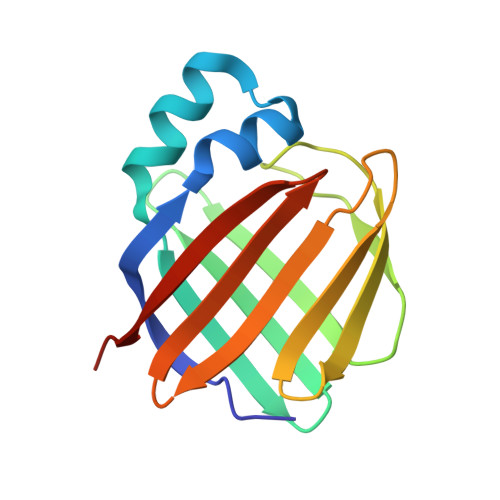Abnormal Cannabidiol Modulates Vitamin A Metabolism by Acting as a Competitive Inhibitor of CRBP1.
Silvaroli, J.A., Widjaja-Adhi, M.A.K., Trischman, T., Chelstowska, S., Horwitz, S., Banerjee, S., Kiser, P.D., Blaner, W.S., Golczak, M.(2019) ACS Chem Biol 14: 434-448
- PubMed: 30721022
- DOI: https://doi.org/10.1021/acschembio.8b01070
- Primary Citation of Related Structures:
6E5L, 6E5T, 6E5W, 6E6K, 6E6M - PubMed Abstract:
Cellular retinol-binding proteins (CRBPs) facilitate the uptake and intracellular transport of vitamin A. They integrate retinoid metabolism, playing an important role in regulating the synthesis of bioactive vitamin A metabolites. Thus, CRBPs constitute potential pharmacological targets to modulate cellular retinoid status that in turn may have applications in the treatment of certain immunological, metabolic, and ocular disorders. Here we identify abnormal cannabidiol (abn-CBD) as a nonretinoid inhibitor of cellular retinol-binding protein 1 (CRBP1). X-ray crystal structures of CRBP1 in complex with abn-CBD and its derivatives revealed a distinctive mode of protein-ligand interaction and provided a molecular basis for the high affinity and selectivity of this compound. We demonstrated that abn-CBD modulates the flux of retinoids via the retinoid cycle in vivo. Furthermore, the biological activity of abn-CBD was evidenced by its ability to protect against light-induced retinal damage in Balb/cJ mice. Altogether, our findings indicate that targeting selected CRBPs with a small-molecule inhibitor can potentially lead to the development of new therapeutic agents to counteract diseases with etiologies involving imbalance in retinoid metabolism or signaling.
- Kent State University , Kent , OH , United States.
Organizational Affiliation:

















